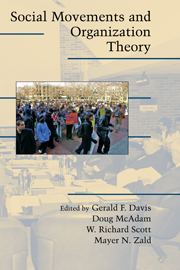Book contents
- Frontmatter
- Contents
- Contributors
- Preface
- I Creating a Common Framework
- II Political and Mobilization Context
- III Social Movement Organizations: Form and Structure
- IV Movements Penetrating Organizations
- 9 THE IMPACT OF SOCIAL MOVEMENTS ON ORGANIZATIONS: ENVIRONMENT AND RESPONSES
- 10 ORGANIZATIONAL CHANGE AS AN ORCHESTRATED SOCIAL MOVEMENT: RECRUITMENT TO A CORPORATE QUALITY INITIATIVE
- 11 SUBVERTING OUR STORIES OF SUBVERSION
- V Conclusion
- References
- Author Index
- Subject Index
11 - SUBVERTING OUR STORIES OF SUBVERSION
Published online by Cambridge University Press: 05 September 2012
- Frontmatter
- Contents
- Contributors
- Preface
- I Creating a Common Framework
- II Political and Mobilization Context
- III Social Movement Organizations: Form and Structure
- IV Movements Penetrating Organizations
- 9 THE IMPACT OF SOCIAL MOVEMENTS ON ORGANIZATIONS: ENVIRONMENT AND RESPONSES
- 10 ORGANIZATIONAL CHANGE AS AN ORCHESTRATED SOCIAL MOVEMENT: RECRUITMENT TO A CORPORATE QUALITY INITIATIVE
- 11 SUBVERTING OUR STORIES OF SUBVERSION
- V Conclusion
- References
- Author Index
- Subject Index
Summary
Three themes have gained attention in the emerging literature at the intersection of social movements, institutions, and organizations. We have drawn upon and contributed to each of these three themes, showing them to be interrelated, in our empirical work on the adoption of gay-friendly policies by organizations. The three themes are 1) social identity construction and legitimation are a basis for social movement mobilization, creating agents even while mobilizing agents; 2) the diffusion of social changes among organizations involves a concomitant diffusion of invented repertoires for action; 3) symbolic resources are vital as both tools for and outcomes of social movement activism; for example, appeals to broad cultural frames such as civil rights are tools for action, and the legitimate inclusion in these frames, such as gay rights becoming regarded as a proper civil rights concern, can be an end. Together, these three themes begin to build a new narrative of how social movements are carried forward by grassroots organizational members. In this chapter, we push on these themes in three ways, respectively: extrapolating across movements to consider concurrent social identity projects; applying a critical analysis to surface the business logics that remain taken for granted even in seemingly inventive repertoires of action; and evaluating symbolic means and ends through which a social movement achieves social change, both in analytical and political terms.
- Type
- Chapter
- Information
- Social Movements and Organization Theory , pp. 310 - 332Publisher: Cambridge University PressPrint publication year: 2005
- 30
- Cited by



